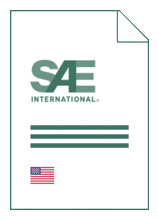
Standard [CURRENT]
SAE J 1681:2023-05-01
Gasoline, Alcohol, and Diesel Fuel Surrogates for Materials Testing
- Publication date
- 2023-05-01
- Original language
- English
- Pages
- 16
- Publication date
- 2023-05-01
- Original language
- English
- Pages
- 16
Product information on this site:
Quick delivery via download or delivery service
Buy securely with a credit card or pay upon receipt of invoice
All transactions are encrypted
Short description
This SAE Recommended Practice presents recommendations for test fuels and fluids that can be used to simulate real world fuels. The use of standardized test fluids is required in order to limit the variability found in commercial fuels and fluids. Commercial fuels can vary substantially between manufacturers, batches, seasons, and geographic location. Further, standardized test fluids are universally available and will promote consistent test results for materials testing. Therefore, this document: a Explains commercial automotive fuel components b Defines standardized components of materials test fluids c Defines a nomenclature for test fluids d Describes handling and usage of test fuels e Recommends fluids for testing fuel system materials The test fluid compositions specified in Section 7 of this document are recommended solely for evaluating materials. They are not intended for other activities, such as engine development, design verification, or process validation unless agreed upon by the contracting parties. Most marketplace fuels contain additives for such purposes as oxidation stability, intake and combustion chamber deposit control, anti-foaming, electrostatics, octane, corrosion mitigation, etc., applied at a parts per million basis. It is not the intention of this document to include a surrogate for the potential effects of these additives. As far as this committee is aware, current additives do not adversely affect fuel system materials. Those contemplating new or improved additives for future applications could use the basic test fluids or fuels from this document, and specify the fuel is to be unadditized in order to inject such additives and use the resulting mixtures to assess whether these new additives might affect fuel system materials. For the purposes of this document, the term FUEL is used in conjunction with fully blended hydrocarbon or hydrocarbon oxygenate mixtures for use in commercial automotive engines. The term FLUID is applied to mixtures of specific controlled components used to simulate the effects of fuels.
Loading recommended items...
Loading recommended items...
Loading recommended items...
Loading recommended items...

